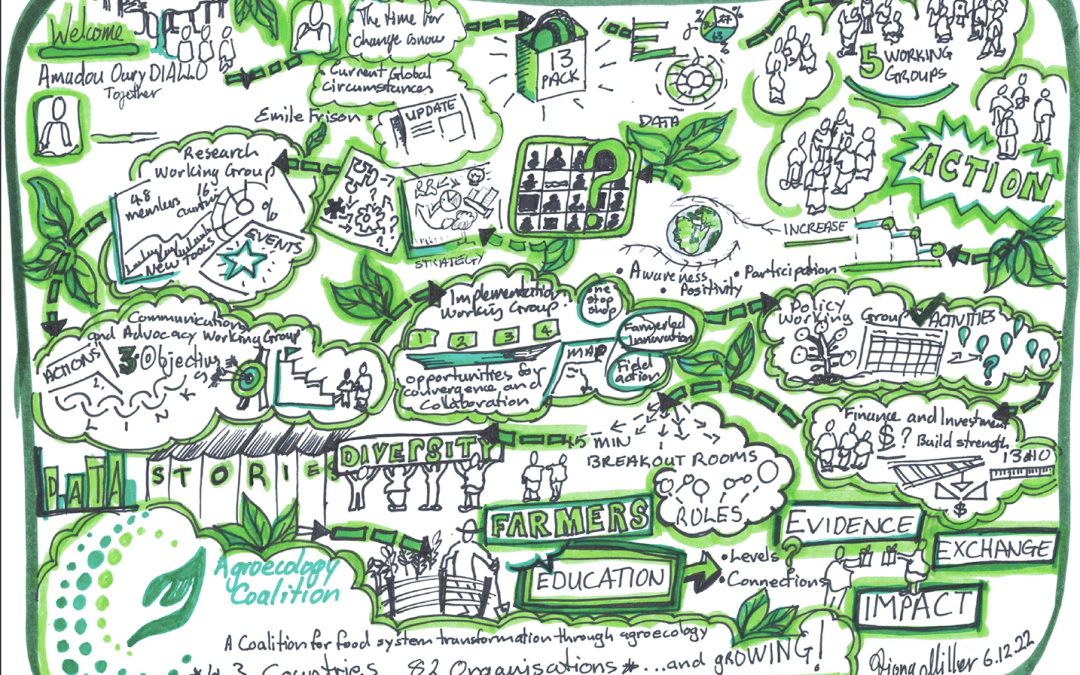Members of the Agroecology Coalition unite to discuss progress and set priorities for the future
As the year is drawing to a close, the Agroecology Coalition held its third all-members meeting in early December, to give an update on the latest developments within the Secretariat as well as set tangible objectives for 2023 and beyond.
Having emerged from the UN Food Systems Summit (UNFSS) in September 2021, the Agroecology Coalition is oftentimes defined as a ‘coalition of the willing’. Participation in this meeting confirmed that member countries and organisations are eager to speed up action to make agroecology widespread around the world. To date, over 44 countries and 88 organisations have joined the Coalition – including the commissions of three regional bodies (the African Union, the European Union and ECOWAS) and key UN bodies, civil society, and research and regional farmers organisations. Importantly, since April this year, the Coalition experienced a two-fold increase in membership – both for its country and organisational members – which is a clear sign that agroecology is gaining momentum globally.
For instance, the recent Coalition’s all-members meeting – which was attended by 23 country representatives, 51 organisational delegates, and eight Secretariat members – provided some interesting membership-related statistics:
- When it comes to country members, 44% are from Africa; 28% from Europe; 14% from Asia, and 14% from the Americas.
- As for the organisational members, most also represent the African continent as well as the NGO sector – with 43% coming from the Global South; 27% from the Global North, and 30% representative of international organisations with a global mandate.
Perhaps one of the key re-occurring themes throughout the meeting was the positive correlation – as well as importance – between biodiversity conservation and agroecology. In his opening remarks, Amadou Diallo, the focal point for Senegal who also represents African countries in the Coalition’s Steering group, highlighted how several recent events (such as the Covid-19 pandemic, geopolitical instabilities and regional conflicts) have contributed to a renewed focus on the sustainability of food production, as well as on agroecological solutions, on a global scale.
The meeting also provided an overview of the Coalition’s working groups, including their respective objectives and the latest work undertaken by each. The five working groups include:
- Research, innovation, and education working group
- Policy working group
- Financing and investment working group
- Communication and advocacy working group
- Implementation working group
A key part of the meeting included a 45-minute discussion in smaller break-out sessions, during which Agroecology Coalition members discussed the benefits of being part of the Coalition, priorities for next year, as well as the members’ role in delivering agroecology-related messaging and boosting its prominence at international events and conferences, such as the UN Climate Change Conference of the Parties, the UN Food Systems Summit, the Convention on Biological Diversity Conference of the Parties, and others.
The illustration below – live sketched during the all-members meeting – provides a visual summary of the event:
The Agroecology Coalition’s Secretariat has been provided by the Agroecology TPP hosted by CIFOR-ICRAF, who has nurtured the Coalition since its inception. The Secretariat of the Coalition, responsible to its now established Steering Committee, will be hosted by Bioversity International in Rome from early in 2023.

